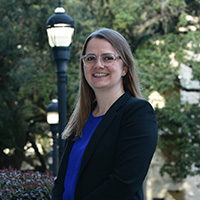
Allison Speer, MD
- Associate Professor, Division of General & Thoracic Pediatric Surgery
- Surgical Director, The Short bowel syndrome Therapy and Rehabilitation (STAR) Program
Biography
Dr. Allison Speer is an Associate Professor Pediatric Surgery at McGovern Medical School at the University of Texas Health Science Center at Houston (UTHealth Houston). She was accepted into the Baccalaureate/MD program and awarded a presidential scholarship to attend the University of Southern California (USC) as an undergraduate. Dr. Speer graduated cum laude with a Bachelor of Science in Biochemistry and received her medical degree from the Keck School of Medicine at USC. She completed her general surgery residency training at Los Angeles County + USC Medical Center in Los Angeles, CA. During residency, she completed a 3 year research fellowship investigating tissue-engineered intestine as a solution for short bowel syndrome at Children’s Hospital Los Angeles in the laboratory of Dr. Tracy Grikscheit, a pediatric surgeon. During that time, she received grant funding from the Ethicon-Society of University Surgeons Surgical Research Fellowship Award. After residency, she completed fellowship training in Pediatric Surgery at Children’s National Medical Center/George Washington University in Washington, D.C. and was recruited to the Program in Children’s Regenerative Medicine in the Department of Pediatric Surgery at UTHealth Houston.
Dr. Speer’s clinical interests include intestinal failure and rehabilitation, advanced minimally invasive surgery, and thoracic/foregut surgery. Dr. Speer is Board Certified in Surgery and Pediatric Surgery by the American Board of Surgery. She is the Surgical Director of the Short bowel syndrome Therapy and Rehabilitation (STAR) team at Children’s Memorial Hermann Hospital and UTHealth Houston. She is also an NIH-funded basic-translational scientist focused on developing novel regenerative medicine strategies for intestinal failure such as tissue-engineered intestine and cell-based therapies. Dr. Speer is passionate about education and mentorship and has received a number of teaching awards as well. She enjoys mentoring at all levels, but particularly future surgeon-scientists.
Education
- BS
- Biochemistry - University of Southern California, Los Angeles, CA
- MD
- Doctor of Medicine - Keck School of Medicine of the University of Southern California, Los Angeles, CA
- Internship
- General Surgery - University of Southern California, Los Angeles, CA
- Residency
- General Surgery - University of Southern California, Los Angeles, CA
- Research Fellowship
- Pediatric Surgery - Children's Hospital Los Angeles, Los Angeles, CA
- Fellowship
- Pediatric Surgery - Children’s National Medical Center, Washington, DC
Areas of Interest
Clinical Interests
• Intestinal failure and rehabilitation
• Advanced minimally invasive surgery
• Thoracic/foregut surgery
Research Interests
• Regenerative medicine strategies for intestinal failure such as tissue-engineered intestine and cell-based therapies.